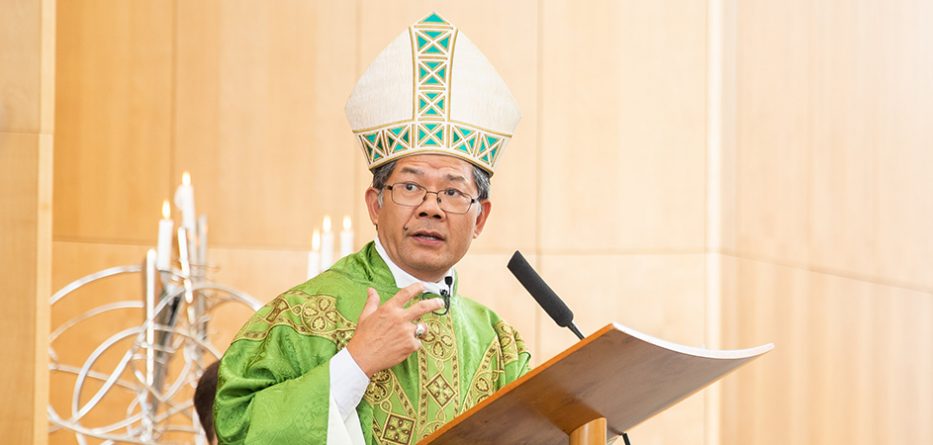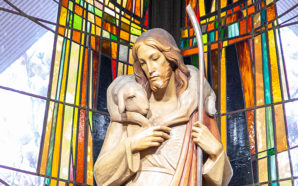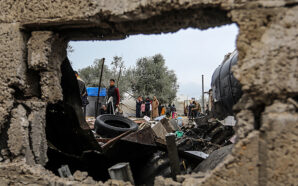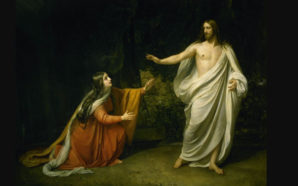Most Reverend Vincent Long Van Nguyen OFM Conv DD STL, Bishop of Parramatta
Homily for the Fifth Sunday of Easter 2019 with the 160th Anniversary of the Foundation of the Parish of Richmond, Richmond
Readings: Acts 14:21-27; Apocalypse 21:1-5; John 13:31-35
19 May 2019
Building God’s dream of a new heaven and a new earth
Sisters and brothers,
It has been quite a momentous few days in the history of our country.
We mourn the passing of a popular former prime minister who – many would say – left a legacy of a better and fairer multicultural Australia. Then with the federal election, we are prompted to reflect further on the achievements and challenges of modern Australia.
By any measure, we are considered a prosperous nation with a rule of law. But we cannot remain content with the status quo, especially when that status quo still falls short of a vision of a more inclusive and humane society.
As Christians, we cannot ignore the needs of the poor, the aged, people with disability, the homeless, the Indigenous people, the asylum seekers and now thanks to Pope Francis’ awareness raising, the fragile environment. We are challenged to imbue the Gospel values into the very fabric of our society in order to transform it into a mirror of God’s Kingdom.
The Word of God this Sunday motivates us to build a society that reflects the divine dream of a new heaven and new earth. In Jesus, God is identified with the vulnerable, the afflicted, and the disadvantaged.
Australia is a very lucky country. That makes us feel good. But equally, it should also spur us on to work and bridge the chasm between the rich and the poor, both within and outside our borders. Success and prosperity can insulate us and make us indifferent towards those who long for the crumbs that fall from our table.
The Acts of the Apostles presents us with a picture of the early Christian community, which is small in size, poor in resources and yet incredibly generous, courageous, outward-looking and even boundary-breaking. Earlier episodes focus on their internal cohesion in the face of external pressure and persecution. They embraced radical solidarity. They all sold their possessions and shared the proceeds in common.
In today’s account, we are told of a watershed moment that marked them to be no longer a Jewish sect. They had done something quite extraordinary. Paul and Barnabas were the first missionaries who had gone beyond the geographical and racial confines of their known world. They shared the Good News with the gentiles and even made them equal members within their group. Christianity was on its way to become a universal movement.
This ground-breaking moment was not without controversy as we learn later of the dispute between Paul and Peter concerning circumcision and admission of non-Jews. What the early Church shows us is that faith is not static but alive.
Each generation of Christians needs to discern how to apply the teachings and examples of Christ in their particular environment.
The Christian movement would have been irrelevant if it had not had the courage to take the vision of Jesus beyond its cultural and historical settings. Today, that same vision of radical love, acceptance, embrace, compassion, and solidarity must guide us.
The Gospel gives us a moving account of Jesus’ farewell discourse with his disciples. After Judas had gone to set in motion the drama of betrayal, arrest and crucifixion, Jesus spoke words of comfort and reassurance to them. There was no fear and anxiety on his part but rather a sense of fulfilment and purpose. Jesus exhorted his disciples to live by the example he had shown them. “I give you a new commandment: Love one another as I have loved you.”
The command to love, of course, was not new. It had been the core teaching of Judaism. But it was the way Jesus lived it out that had the wedge of newness. In his embrace of the most vulnerable, despised and marginalised, Jesus defined or even redefined what true love meant. He embodied the God who loves without limits and empowers everyone without exception to live a life of dignity.
Brothers and sisters,
Today, we joyfully gather to give thanks to God for the gift of this faith community, which was officially inaugurated some 160 years ago. Generations of Catholic faithful here have lived out their call to be a sign of God’s love and an oasis of hope. The institutional Church has lurched from one crisis to another.
But here, the community of faith, hope and charity that you have sustained is the Church at the coalface. This Church nurtures, supports and transforms lives in so many ways. Despite all the challenges that we face going forward, we will not lose sight of what our faith in Jesus means and what being his living body means.
There is much that we can learn from the early Christian community. As we lose much of what we have accumulated over the centuries, including our affluence and influence, let us not be afraid to learn anew the trust and love without limits.
St John in the Second Letter speaks of the passing of the old and the emergence of the new heaven and new earth. It may be understood as a metaphor for what we are going through. The Church must die to whatever is unworthy of the Gospel and rise to new and fresh ways of being companion to people of today.
Let us pray that we followers of Christ may not grow stale and insipid. Like him, may we have the courage to leave our security, to accompany, to serve and to empower all people to live life more fully. In this way, may we be an agent of the Gospel and able to transform our society into what God intends for all.








